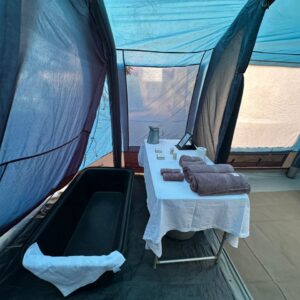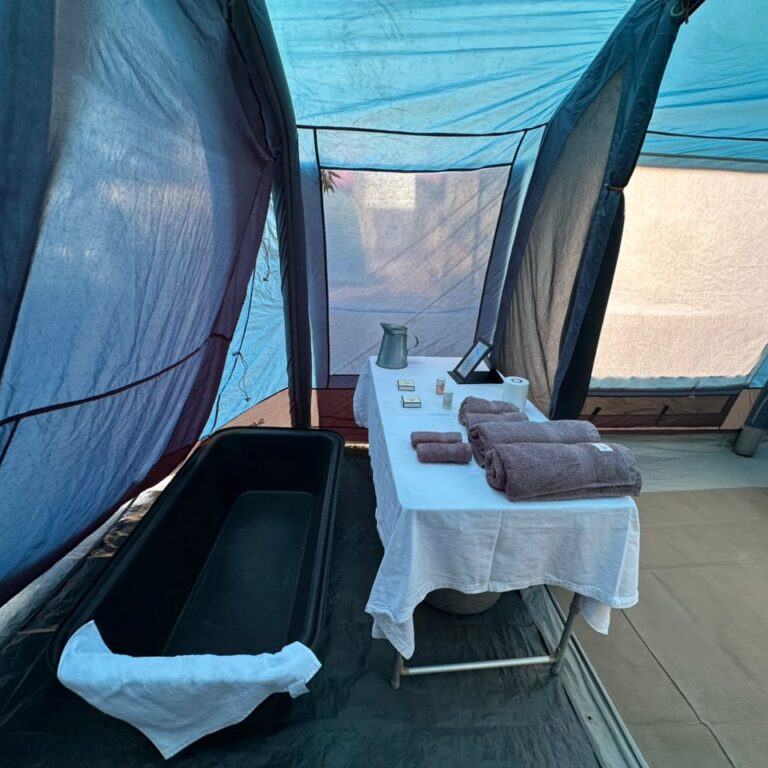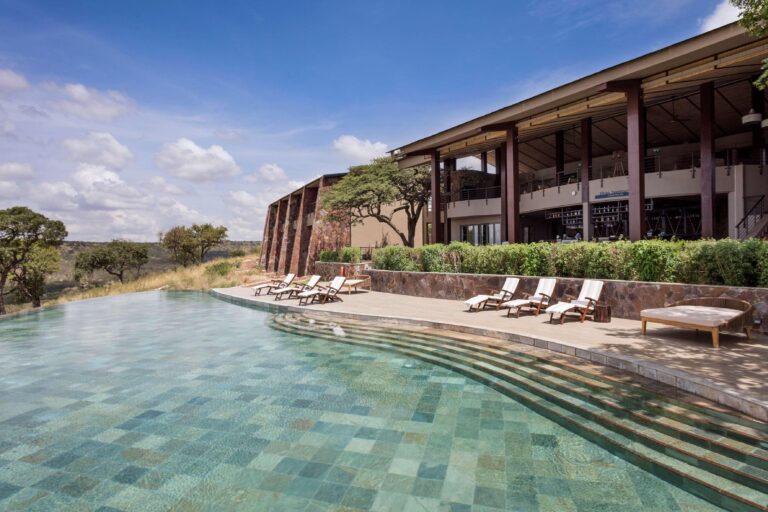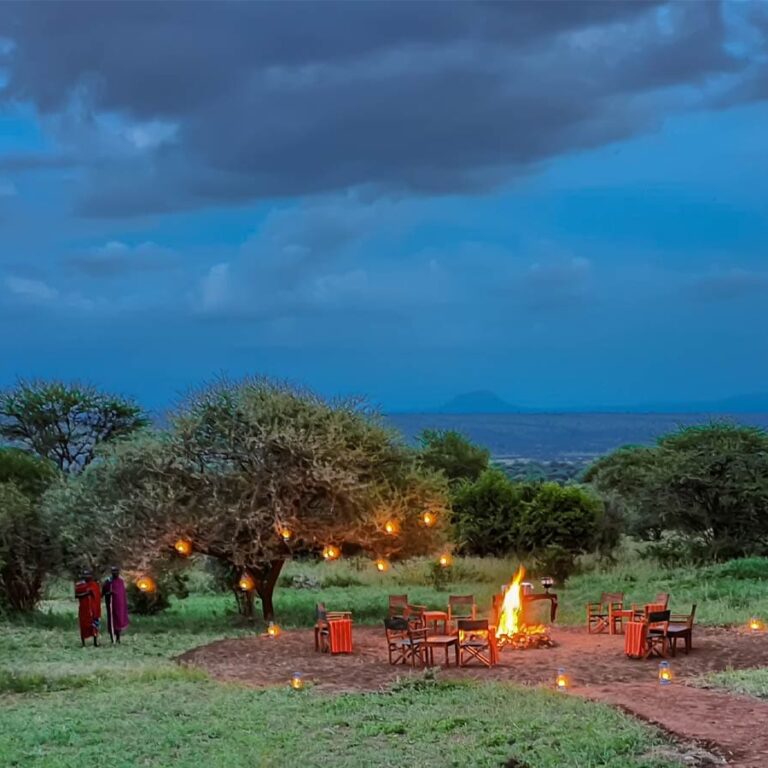The Hadza people of Tanzania are one of the last hunter-gatherer societies on Earth, and what we can learn from the Hadzabe. Their way of life can teach us valuable lessons about living in harmony with nature, our bodies, and each other. They only rely on the land and natural world to survive. The Hadzabe have been coexisting with nature for countless years and consider themselves to be stewards of the land. They hunt animals to survive and use plants for food and medicine. What can we learn from the Hadzabe Tribe? Here are 6 ways the Hadza can teach us to live in greater harmony with nature, our own bodies, and each other — no foraging required. Let’s dive into six key teachings from the Hadza that can inspire us.
We can learn from the Hadza hunter-gatherers of Tanzania about a more harmonious, nature-connected way of life, a deep understanding of the environment, and a highly egalitarian social structure with collective responsibility and minimal possessions. Their wild, whole-food diet is linked to excellent health, their nomadic lifestyle demonstrates sustainable living, and their lack of social hierarchy and emphasis on group success highlight lessons in teamwork and shared responsibility.
Lesson Learn 1: Embrace a Natural Diet
The Hadza eat what the land offers. Their diet consists of wild fruits, tubers, and game. This natural way of eating shows us the importance of whole foods. Eating fresh, unprocessed foods not only nourishes our bodies but also connects us to the Earth. The Hadza survive by hunting their food with hand-made bows and arrows and foraging for edible plants. Imagine biting into a sweet, juicy berry you picked yourself. Doesn’t that feel more satisfying than a sugary snack from a package?
Lesson Learn 2: Stay Active and Mobile
Life for the Hadza is about movement. They walk long distances daily, whether hunting or gathering food. This constant physical activity keeps them fit and healthy. In our modern world, we often sit for too long. By integrating more movement into our lives—like taking walks in nature or playing outside—we can boost our energy and well-being. Wouldn’t you rather feel vibrant and alive rather than sluggish and tired?
Lesson Learn 3: Value Community and Connection
The Hadza place a strong emphasis on community. They share food, stories, and experiences. This sense of togetherness fosters deep connections and support systems. In our busy lives, we might forget to nurture relationships. Reaching out to friends and family, or simply sharing a meal, can create bonds that enrich our lives. Think about how you feel after spending time with loved ones—doesn’t it warm your heart?
Lesson Learn 4: Respect Nature’s Rhythm
Living in sync with nature is vital for the Hadza. They understand the seasons, animal behaviors, and plant cycles. This awareness helps them thrive in their environment. For us, being mindful of nature’s patterns can enhance our lives, too, like Tanzania’s last hunter-gatherers: the Hadzabe tribe of Lake Eyasi. Spending time outdoors and observing the world around us can bring peace and clarity. Have you ever noticed how a walk in the woods can refresh your mind and spirit?
Lesson Learn 5: Prioritize Play and Joy
The Hadza incorporate play into their daily lives. The Hadza Tribe: Tanzania’s Modern Primitive People. Children and adults alike engage in games and laughter. This joyful approach to life keeps stress at bay and fosters creativity, which we can learn from the Hadzabe. In our pursuit of productivity, we often forget to have fun. Meet the Hadzabe Tribe of Northern Tanzania. Making time for hobbies and laughter not only boosts our mood but also strengthens our relationships. Imagine how your day changes when you stop to enjoy a silly moment with friends—doesn’t it feel lighter?
Lesson Learn 6: Live Simply
The Hadza lead a life free from excess. They use what they need and share resources with others. What we can learn from the Hadzabe. This simplicity allows them to focus on what truly matters. In our consumer-driven society, we can get caught up in accumulating things. By decluttering our lives and valuing experiences over possessions, we can find deeper satisfaction. What if instead of buying more stuff, we invested in adventures and memories?
Fascinating Facts about the Hadzabe Tribe At Lake Eyasi
The Hadzabe tribe, residing near Lake Eyasi in Tanzania, is one of the last remaining hunter-gatherer communities in Africa. With a deep connection to their environment, they live a nomadic lifestyle, relying on traditional methods to hunt and gather food. Their unique click language and ancient customs have been preserved for thousands of years, offering a fascinating glimpse into a way of life that has remained unchanged by modern influences.
Uncovering The Fascinating Culture Of The Hadzabe Tribe At Lake Eyasi
Uncover the intriguing culture of the Hadzabe tribe at Lake Eyasi, one of Tanzania’s last hunter-gatherer communities. Experience their unique way of life, from traditional hunting methods to ancient rituals. The Hadzabe people, with their rich oral traditions and deep connection to nature, offer a rare glimpse into a lifestyle that has remained largely unchanged for thousands of years, providing an unforgettable cultural immersion.
Why is it important for us as humans to learn about the Hadza culture?
Many hope that by studying the Hadza people, we can learn more about our own origins as human beings. Similarly, by learning about the Hadza language, we may learn more about the origin of language itself. A handful of organizations are working to preserve the Hadza language.
What can we learn about emotions by talking with the Hadza?
Whether the goal was to escape harm, satiate hunger, alleviate sickness, or remove conflict, Hadza participants tended to speak of it as necessary and present. This sense of immediacy created a sense of being in the present moment. This was clear even when descriptions were not about physical or urgent needs.
What is the Hadza tribe known for?
Northern Tanzania is home to the Hadzabe, one of the last remaining hunter-gatherer tribes on Earth. Known for shunning material possessions and social hierarchy, the Hadza roam as needed to find game, tubers, and wild berries. Even though the life expectancy at birth is only 31.5 years, there are plenty of very old Hadza. A person who makes it to age 18 is likely to live to be 60, and one who makes it to 45 is likely to live to be 66.
Where does the Hadza tribe live?
Northern Tanzania is home to the Hadzabe, one of the last remaining hunter-gatherer tribes on Earth. Known for shunning material possessions and social hierarchy, the Hadza roam as needed to find game, tubers, and wild berries. Hunter-gatherer societies understand that their survival depends on natural resources.
Who Are the Hadzabe Hunter-Gatherers in Lake Eyasi, Tanzania?
The Hadza, or Hadzabe (Wahadzabe, in Swahili), are a protected hunter-gatherer Tanzanian indigenous ethnic group, primarily based in Baray, an administrative ward within Karatu District in southwest Arusha Region. They live around the Lake Eyasi basin in the central Rift Valley and in the neighboring Serengeti Plateau.
Conclusion: Learning from the Hadza
The lessons from the Hadza tribe remind us to reconnect with nature, nourish our bodies, and strengthen our relationships. By adopting their way of life, we can cultivate a sense of harmony that enriches our lives, and we can learn from the Hadzabe. So, why not incorporate one or two of these teachings into your daily routine? After all, living in balance with ourselves and our world is a journey worth taking.
Best Life Lessons You Can Learn In Your Tanzania Family Safari
A family safari in Tanzania offers life lessons such as fostering a deeper appreciation for nature and wildlife, promoting environmental stewardship by understanding ecosystems, learning about cultural respect and diversity through community engagement, cultivating teamwork and communication skills during shared experiences, developing resilience and adaptability when facing the unfamiliar, and strengthening family bonds through shared adventures away from everyday distractions.
Why Family Safaris Are A Life-Changing Adventure for All Ages?
Family safaris are life-changing due to their immersive blend of educational opportunities, such as learning about biodiversity and conservation, and deepening family connection through shared adventures and off-screen quality time. These trips foster empathy and cultural understanding by exposing families to local communities and creating lasting memories as participants witness incredible wildlife and stunning landscapes. Modern safari lodges and tour operators also offer tailored experiences for all ages, making the journey accessible and engaging for everyone in the family.
Hidden Benefits of a Family African Safari
Hidden benefits of a family African safari include strengthening family bonds through shared, Multi-Generational Travel in Africa, screen-free experiences, fostering environmental stewardship and global citizenship by exposing children to real-world conservation efforts and diverse cultures, promoting cognitive and personal growth through challenges like navigation and adapting to new environments, and inspiring a deeper appreciation for nature and simplicity by shifting priorities away from materialism.
Planning the Perfect Family Safari With Kids
To plan the perfect family safari, choose family-friendly lodges with kids’ programs, private vehicles, and child-centric guides; consider malaria-free areas; opt for shorter, flexible game drives and diverse activities like walks and cultural visits; pack appropriately and set realistic expectations about seeing animals; choose a suitable travel time, often avoiding the peak rainy season; and don’t focus solely on the Big 5.
A Guide to Going on Safari with Kids
To go on safari with kids, select age-appropriate destinations, like South Africa or Kenya, that offer family-friendly accommodations and activities. Book a private safari vehicle for more flexibility, pack child-friendly items like binoculars and journals to keep them engaged, and prioritize safety with sun and insect protection, vaccinations, and strict rules about staying in the vehicle and respecting wildlife. Adjust expectations, bring plenty of snacks, and ensure you choose lodging with amenities like kids’ programs to make the trip comfortable and enjoyable for the whole family.
Here’s What Really Matters on a Tanzania Family Safari
For a memorable Tanzania family safari, focus on choosing an experienced safari company, selecting family-friendly accommodations with pools and kid-friendly services, and ensuring comfortable, safe vehicles. Engage with local culture through Maasai or Hadzabe interactions and incorporate diverse activities like bush walks and beach time in Zanzibar for a well-rounded experience. Prioritize responsible wildlife viewing by teaching children to respect animals and their habitat.
What children can learn on an African Safari?
On an African safari, children can learn about wildlife, biodiversity, and the importance of conservation, developing a deeper understanding of natural ecosystems. They can also gain cultural awareness and empathy by interacting with local communities and learning about diverse ways of life. Additionally, safaris offer opportunities to build practical life skills, such as problem-solving and critical thinking, foster family bonds, and experience a sense of adventure and resilience.
The Life Lessons I Learned On Safari In Africa
On safari in Africa, people learn lessons in patience and presence, observing nature’s cycles and the importance of slowing down to appreciate life’s small wonders. They gain perspective on their own resilience and adaptability by witnessing the survival instincts of wild animals, and develop a deeper sense of connection to nature, appreciating its raw beauty and the wisdom of collective living. The experience also teaches the value of respect for nature, highlighting our place within the larger food chain and the importance of letting nature take its course.
How to Pack and Prepare for an African Safari?
To prepare for an African safari, you must gather your documents, including your passport and vaccination certificates, and visit a doctor for necessary vaccines and malaria tablets. Pack clothing in neutral, earthy tones for wildlife viewing, such as tan, green, and khaki, to avoid attracting insects and offending animals. Essential best luggage for African safari clothing includes long-sleeved shirts, lightweight pants, a warm jacket or fleece, printable safari packing list a wide-brimmed hat, and comfortable, closed-toe shoes. Don’t forget a first-aid kit, high-SPF sunscreen, insect repellent, and essential toiletries.
What not to pack for an African safari?
Do not pack bright or dark-colored clothing, camouflaged items, excessive electronics like hair dryers, fine jewelry, plastic bags, or strong-smelling perfumes on an African safari. Also, avoid dressy outfits, expensive valuables, and drones, which are restricted. Focus on neutral, lightweight clothing and soft-sided luggage for comfort and to adhere to aircraft restrictions.
Essential Packing Tips for Your African Safari
For a successful safari, pack neutral-colored, lightweight, and breathable clothing such as long-sleeved shirts, pants, and layers, along with a wide-brimmed hat, sunglasses, and comfortable walking shoes. Essential Safari packing list men’s accessories include a camera with a telephoto lens, binoculars, sunscreen, insect repellent, and a soft-sided duffel bag. Don’t forget vital documents like your passport and visa, along with any personal medications and a first-aid kit.
African travel tips: The best day packs for an African safari are soft, quiet, and earth-toned to blend into the environment and provide a comfortable, durable, and organized carrying solution. Key features to look for include water-resistant materials, multiple compartments, padded straps, and hydration compatibility. Brands like Mystery Ranch and Kuiu are excellent choices, with the Mystery Ranch Coulee being a popular option for its durability and easy access.
What to Know Before Your First African Safari?
Before your first African safari, plan by researching destinations and the best time to go based on your interests, then book a reputable safari guide or tour company. Pack light, but bring layers of neutral-colored clothing for varied temperatures and dusty conditions, plus essentials like binoculars, sunscreen, and insect repellent. Prioritize health by getting necessary vaccinations and medications, and don’t forget cash for tips and a backup credit card. Embrace early mornings, be patient with the slower pace of things, and maintain realistic expectations about wildlife viewing to fully enjoy the experience.
How to Prepare for Your First African Safari Tours?
To prepare for your first African safari, choose the right destination and timing based on your interests, pack light in neutral, layered clothing, book with a reputable operator, get necessary vaccinations, pack a personal first-aid kit, and obtain comprehensive travel insurance. You should also bring high-quality binoculars and a camera with a zoom lens, cash for tips, and be prepared for early mornings and dusty conditions.
A Beginner’s Guide to Planning Your First African Safari
To plan your first African safari, start by defining your budget, which influences choices on accommodation and activities. Next, choose your destination based on what you want to see, such as the Big 5 in Tanzania, and then decide when to travel, considering the dry season for easier wildlife spotting or the wet season for baby animals and photographers. Finally, select your safari experience, whether it’s a budget-friendly group tour or a luxury private trip with specialized lodges, and consult experts to handle the complex logistics for a stress-free experience.
A Complete Packing List for Your First African Safari
For a first African safari, pack neutral-colored, lightweight clothing for layering, such as long-sleeved shirts, pants, and a warm jacket, along with a sunhat and comfortable walking shoes, women’s safari packing list. Essential Luxury safari packing list gear includes binoculars, a good camera, sunscreen, and insect repellent, plus a small first-aid kit and any personal medications. Choose soft-sided luggage, bring a reusable water bottle and travel adapter, and consider packing a swimsuit for relaxing by the pool.








